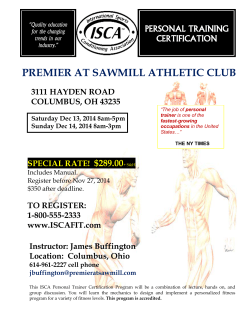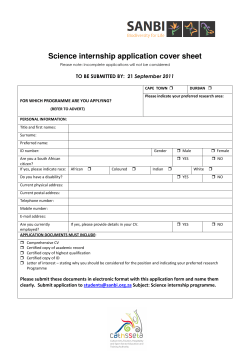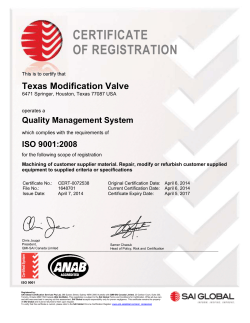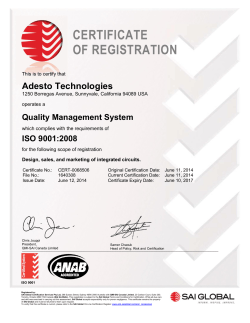
the 2015 newsletter. - National Registry of Certified Chemists
NRCC NEWS January 2015 National Registry of Certified Chemists Volume 36 EXECUTIVE DIRECTOR’S MESSAGE It was a crazy year for NRCC as our modernization continues. For the first time, applicants were able to download all application and reference forms, and certificate holders were able to download renewal forms. The “electronic paper” trail for submittals has made our job easier, and provides an extra level of assurance that important documents don’t get lost in the mails. Both applications and new certificants have increased due to increased interest in professional certification. There has been a sizeable increase in both applications and certification renewals, which shows the value of NRCC Board certification in many scientific fields. While Chemical Hygiene Officer continues as the highest volume certification program, there have been steady increases in Clinical Chemist and Toxicological Chemist, as more and more states require Professional Board certification for laboratory positions. We are still working on ways to improve service and keep things running as smoothly as possible. Please feel free to make any suggestions you feel are appropriate. As always, I would like to thank the American Chemical Society (ACS) American Association for Clinical Chemistry (AACC), American Board of Clinical Chemistry (ABCC), American Industrial Hygiene Association (AIHA), American Institute of Chemists (AIC), and the National Academy of Clinical Biochemistry (NACB) for their continued financial support and/or sponsorship, including nominating representatives to the board of directors. Please feel free to contact me by email or phone any time if you have a question or if we can help you in any way. 2015 Board of Directors Mark Marzinke, PhD, President Marie Bevier, BA, NRCC-EAC Laurence Doemeny, PhD Robert West, MS Douglas Walters, PhD Jean Joseph, PhD Steven Kazmierczak, PhD Charles (Gus) Manning, PhD Christopher McCudden, PhD Douglas Stickle, PhD Russ Phifer, BA, Executive Director NRCC 125 Rose Ann Lane, West Grove, PA 19390-8946 610-322-0657 / 800-858-6273 Fax / rphifer@nrcc6.org NRCC NEWS January 2015 National Registry of Certified Chemists Volume 36 President’s Column It has been an honor and my great pleasure to serve as the NRCC President for 2014. I follow in the footsteps of impressive and wonderful people, most recently Douglas Walters. I’m sure I speak for the entire Board of Directors when I express my thanks to Russ Phifer for his dedication and hard work this past year. Russ has done an outstanding job in continuing to make the transition from Gilbert Smith a smooth and uneventful change. I don’t think most of members are aware of the work and time involved in being the NRCC Executive Director. Russ initiated, coordinated and implemented the complete update of all the electronic aspects including the databases of the NRCC. Many of the changes Russ made have helped to keep membership costs down. In addition, the international aspects of the NRCC require he be available 24/7. This year the NRCC completed the revision of the Chemical Hygiene Officer certification exam and the evaluation of the certification process. The certification exam now reflects what a Chemical Hygiene Officer will encounter on the job today including the Globally Harmonized System of Classification and Labeling of Chemicals (GHS). Through the efforts of the Executive Officer, Russ Phifer, the NRCC travels to more national meetings (ACS, AIChE, NAOSMM, AACC) giving the NRCC more visibility and an increased interest by scientists in becoming certified. The National Registry of Clinical Chemists was organized in 1987 and changed its name to the more appropriate National Registry of Certified Chemists in 1999. The original purpose of the NRCC was to certify Clinical Chemists and Clinical Chemistry Toxicologist. Certification for Toxicological Chemists came in 1987, followed by Chemical Hygiene Officers in 1987, Environmental Analytical Chemists and Environmental Analytical Technicians in 1998. The NRCC continues to be a high regarded and widely accepted certification Program. Many states recognize NRCC certification as a part of the credentials for licensure of certain laboratory personnel. NRCC 125 Rose Ann Lane, West Grove, PA 19390-8946 610-322-0657 / 800-858-6273 Fax / rphifer@nrcc6.org NRCC NEWS January 2015 National Registry of Certified Chemists Volume 36 Congratulations and welcome aboard to all the new members. Congratulations to everyone on a job well done! Laurence Doemeny, Ph.D. President, NRCC New 2014 Certificate Holders CC CC CC CC CC CC CC CC CC CC CC CC CC CC CHO CHO CHO CHO CHO CHO CHO CHO CHO CHO CHO CHO EAC Nandkishor Chindarkar Robert Dixon Jonathan Hart Ayman Ibrahim Lewis Jackson Geeta Kala Yungkang Lee Lori Milner Hanan Mohamad Jeanne Rhea Jody Rule Manoj Tyagi Shaiju Vareed Yujing Wen Donia Arthur Nora Czar Osamede Evbuomwan Shanti Jonchhe Rachel Layman Sherman Lee Adam Martin Lisa Savage Megan Utley Debora Waxer Mary Williams Christine Wood Cicy Jacob EAC TC TC TC TC TC TC TC TC TC TC TC TC TC TC TC TT TT TT TT TT TT TT TT TT TT Jacob Kovoor Victor Anbalagan Bradley Baciak Gilmer Cawich Andrew Clark William Draper Antoinette Gaston Phillip Gibbs Yo-Chan Jeong David Klein Dayong Lee Ken Lewis Cecilia Melgar Lisa Reidy Shenu Sehgal Lakshminiranjan Vanimreddy Samantha Bishop Sheila Comia Voltaire De Leon Elizabeth Gonzales Albert Hsu Sergey Latyshev Wendy Man Joyce Nickley Stacy Ordonio Glenn Parrent NRCC 125 Rose Ann Lane, West Grove, PA 19390-8946 610-322-0657 / 800-858-6273 Fax / rphifer@nrcc6.org NRCC NEWS January 2015 National Registry of Certified Chemists Volume 36 Frequently Asked Questions What is involved with getting my application approved? Your application form must be completed, notarized and submitted. Yes, it can be scanned and submitted electronically, or faxed. Once we have a completed application and the application fee, a file is established for you and you’re assigned a registration number. Do I have to take the exam at one of the scheduled times and dates listed on the website? No! About 95% of applicants take the examination at approved testing centers or with approved local proctors. Many colleges, universities, public libraries, and commercial testing centers (such as Sylvan Learning Centers) offer proctoring services. You may also use a local NRCC certificate holder or Board of Director member as a proctor, and in some cases we have approved supervisors or religious leaders. If you aren’t sure about the acceptability of a proctor, just ask! In most cases all that is required is an email from the proctor agreeing to administer the exam according to our procedures, along with a mailing address and scheduled test date. What is a passing score on the exam? Based on standards established by the Board of Directors, which may change periodically, the current passing grades are as follows: Chemical Hygiene Officer, Clinical Chemist, Clinical Chemistry Technologist, Toxicological Chemist, Toxicological Technician – 60% (90 of 150). Environmental Analytical Chemist and Environmental Analytical Technician – 65% (98 of 150); How is the Board of Directors elected, and what do they do? The BOD consists of representatives nominated by the following organizations: American Association for Clinical Chemistry, American Board of Clinical Chemistry, American Chemical Society, and the American Industrial Hygiene Association. Members are elected to three year terms, and can serve a maximum of three terms. The Board members are responsible for establishing and maintaining standards and qualifications for the granting, issuing and renewing of certifications. They participate in the development of new tests NRCC 125 Rose Ann Lane, West Grove, PA 19390-8946 610-322-0657 / 800-858-6273 Fax / rphifer@nrcc6.org NRCC NEWS January 2015 National Registry of Certified Chemists Volume 36 and programs, and all applications are evaluated by a credentials committee consisting of three Board members. We are fortunate to have a dedicated, productive Board who contribute considerable time to support NRCC. Will you notify my state agency of my new certification if I need certification for my licensing? Yes, if you send an email request and provide the appropriate contact information. There is no charge for this service. NRCC 2015 (Subject to change) Test Dates & Locations January 16 Natick, MA January 22 Vanguard University, Costa Mesa, CA February 12 Natick, MA Mar 22 ACS, Denver, CO Mar 20 Natick, MA Apr 17 Natick, MA May 7 Natick, MA June 26 Natick, MA July 10 Natick, MA July 31 Natick, MA Aug 16 ACS, Boston, MA Oct 9 Natick, MA Oct 30 Natick, MA Dec 4 Natick, MA Thank you to the Laboratory Safety Institute for hosting NRCC exams following their CHO workshops. Additional dates will be added as determined. Exams may also be scheduled with local proctors. Contact the office for details. Volunteers are always needed to write test questions! Let us know if you have a good one in your field, and we’ll try it out in our next test version. Don’t forget to renew your certification. Certificate holders are granted a one year grace period beyond the normal three year certification period. If your last paid certification year was 2012, you have until the end of 2015 to catch up. NRCC 125 Rose Ann Lane, West Grove, PA 19390-8946 610-322-0657 / 800-858-6273 Fax / rphifer@nrcc6.org NRCC NEWS January 2015 National Registry of Certified Chemists Volume 36 EXPERIENCE STANDARDS We are often asked why we require that experience in the specified certification field must be in the past six years, and how experience is determined since there are subtleties between several of the different certifications. Applicants frequently change fields from clinical to toxicological, or analytical to clinical, etc., or return to a previous field. We count on your professional references to respond to specific questions regarding your experience, and the references are combined with your professional resume to provide our credentials committee with enough information to make an informed decision regarding your application. Keep in mind that a strong application is usually a good sign that the applicant is able to pass the examination on the first try! Before applying, carefully review the education and experience requirements, and review the professional reference form before you provide it to your colleagues for completion. Sample Questions (CHO) What is the secondary effect of a hydrofluoric acid burn? A. Asthma B. Gangrene C. Malignant tumor D. Nephritis (CC) A solution prepared by dissolving 1 mol of solute in 1 kg of solvent would have a concentration designated as: A. 1 molar B. 1 molal C. 1 normal D. 1% by volume E. 1% by weight (CCT) Both the parent drug and an active metabolite should be measured when monitoring: A. Theophylline B. Procainamide C. Phenytoin D. Digoxin E. Phenobarbital (TT) Therapeutic serum lithium levels should be in the range of: A. 2.0-4.0 mMol/L. B. 0.6-1.5 mMol/L. C. 3.0-5.0 mMol/L. D. 1.8-31.1 mMol/l (CC) The best parameter to compare precision between methods, analytes, etc., is: A. Coefficient of Variation (CV) NRCC 125 Rose Ann Lane, West Grove, PA 19390-8946 610-322-0657 / 800-858-6273 Fax / rphifer@nrcc6.org NRCC NEWS January 2015 National Registry of Certified Chemists Volume 36 B. Standard Deviation (SD) C. Standard Deviation Index (SDI) D. Correlation Coefficient Please send your exam questions in! We are working on establishing an annual prize for the certificate holder who provides the most valid examination questions (please provide the answer as well). NRCC 125 Rose Ann Lane, West Grove, PA 19390-8946 610-322-0657 / 800-858-6273 Fax / rphifer@nrcc6.org
© Copyright 2025











